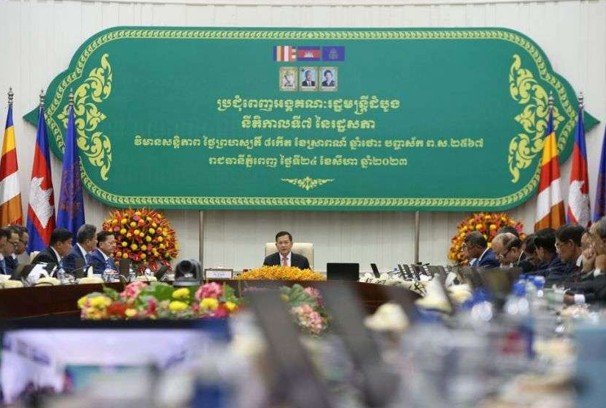Cambodia has set an ambitious goal for itself. Under the newly launched Pentagonal Strategy – Phase I, the government aims to transform the country into a high-income economy by 2050. The strategy, introduced by Prime Minister Hun Manet in August 2023, builds on decades of economic progress while addressing new challenges in governance, sustainability, and technology.
For a country that has experienced some of the fastest economic growth in Southeast Asia, this plan marks a turning point.

It signals Cambodia’s intent to move beyond low-wage manufacturing and tourism, pushing instead for digital transformation, stronger infrastructure, and human capital development. But questions remain—can Cambodia sustain this vision while balancing political stability, foreign debt, and regional competition?
A Blueprint for the Future
For nearly two decades, Cambodia’s economic roadmap followed the Rectangular Strategy, which focused on growth, employment, equity, and efficiency. The Pentagonal Strategy builds on these pillars while adding two new priorities: technology and sustainability.
The plan revolves around five key areas: people, roads, water, electricity, and technology. The government’s goal is to create a modern, connected, and resilient economy by investing in education, healthcare, infrastructure, and renewable energy. The introduction of technology as a central pillar reflects Cambodia’s ambition to compete in a global digital economy, a shift that will require substantial investment in skills and innovation.
Building Human Capital
A major focus of the Pentagonal Strategy is developing Cambodia’s workforce. The country has one of the youngest populations in the region, but education and vocational training remain underfunded. To compete with regional economies like Vietnam and Thailand, Cambodia will need to significantly improve its education system.
Technical and vocational education has been identified as a key priority. The government is expanding TVET (Technical and Vocational Education and Training) programs, aiming to equip young Cambodians with the skills needed for high-value industries such as IT, engineering, and advanced manufacturing.
Healthcare is also receiving more attention. While Cambodia has made substantial progress in public health, access to medical services remains a challenge in rural areas. The strategy calls for greater investment in healthcare infrastructure to ensure that economic growth is matched by improvements in living standards.

Infrastructure: The Backbone of Growth
Infrastructure remains at the heart of Cambodia’s development plan. The Pentagonal Strategy prioritizes major projects that will improve trade, transportation, and energy access.

The country has already seen rapid expansion in roads, bridges, and ports, thanks to foreign investment, particularly from China. Key projects include:
- The Phnom Penh-Sihanoukville Expressway, which has drastically reduced travel time between the capital and Cambodia’s economic gateway to the sea.
- The Techo International Airport, a $1.5 billion project expected to increase Cambodia’s capacity to handle international trade and tourism.
- The Funan Techo Canal, a $1.7 billion project aimed at improving water transportation and boosting agricultural exports.
These projects are expected to enhance Cambodia’s connectivity with regional markets while reducing logistics costs for businesses. However, questions remain about financing and long-term debt sustainability, given that many of these projects rely on Chinese loans and foreign investment.
Balancing Economic Ties
One of Cambodia’s biggest challenges is navigating its growing dependence on China. Beijing remains the country’s largest investor, financing everything from infrastructure to special economic zones. More than 40% of Cambodia’s foreign debt is owed to China, raising concerns about debt dependency and economic leverage.

At the same time, Cambodia has been diversifying its economic partnerships. It has strengthened trade agreements with Japan, South Korea, and the European Union, and the Cambodia-Korea Free Trade Agreement (CKFTA) is expected to boost exports.
The government has also embraced the Regional Comprehensive Economic Partnership (RCEP), the world’s largest trade pact, which includes China, Japan, South Korea, and ASEAN nations. These agreements are expected to create new investment opportunities while reducing Cambodia’s reliance on a single economic partner.
Governance and Reform
For the Pentagonal Strategy to succeed, Cambodia will need to overhaul its governance system. The country has made progress in economic liberalization, but corruption, bureaucracy, and inefficiencies remain barriers to growth.
The government has pledged to improve transparency, streamline regulations, and reduce bureaucratic hurdles for investors. However, implementing these reforms will require strong political will and institutional capacity.
Public-private partnerships are expected to play a major role in driving investment, but Cambodia’s legal and regulatory framework still needs strengthening to attract more diverse sources of funding.
What Lies Ahead?
The Pentagonal Strategy – Phase I (2023-2028) will be the first real test of Cambodia’s long-term economic vision. The country aims to achieve upper-middle-income status by 2030, setting the foundation for its high-income aspirations by 2050.
But Cambodia’s future growth will depend on its ability to manage economic risks, attract investment, and sustain reform momentum. The country remains vulnerable to global economic shocks, geopolitical tensions, and environmental challenges.
Yet Cambodia has shown resilience before. From a nation emerging from conflict to one of ASEAN’s most dynamic economies, its rapid transformation has already defied expectations. If the Pentagonal Strategy can be effectively implemented, Cambodia could position itself as a major economic player in Southeast Asia—not just a country catching up, but one setting the pace for the future.


